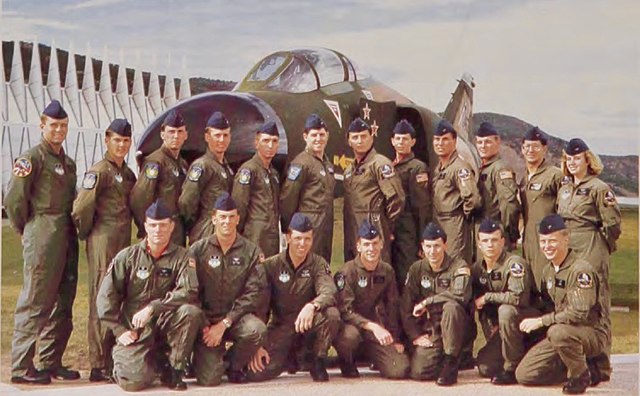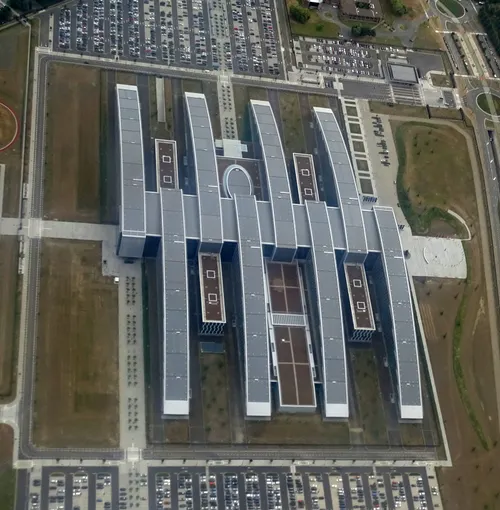
Please Follow us on Gab, Minds, Telegram, Rumble, Gab TV, GETTR
Doug Goodman also contributed to this article...
In June 1968, 1254 of us Basic Cadets with newly shaved heads attended a briefing in Arnold Hall given by Brigadier General and triple ace Robin Olds. He began, “Look to the gentleman on your right.” 1254 heads snapped right. “Look to the gentleman on your left.” 1254 heads snapped left. “Four years from now one in three of you will not be here.” Most of us thought that third person would be someone else!
The general was right, and we were wrong. In June 1972 only 752 or 60% of our class graduated. In the ensuing four years we learned an important lesson. Those who left prematurely were not losers or quitters, but often the strongest amongst us and some of our best friends. The four year Academy experience either reinforced or diminished career expectations. Some found the challenges of cadet life exhilarating and embraced it, while others rejected it and made the rational decision that a career in the Air Force was “just not for them.” A 1/3 attrition rate is natural, historically validated, and mutually beneficial for the institution and prospective career officers.
The single best high school indicator of success at the Academy is the motivation to make the Air Force a career. Most seventeen and eighteen year olds are ill equipped to make life long judgements, and, unfortunately, there are no other selection criteria that can reliably predict success. The four year Academy experience of demanding academic, leadership, and physical challenges becomes the testing ground for identifying which cadets will be the optimum match for an Air Force career.
Lower attrition rates have led to another disturbing trend: the number of graduates making the Air Force a career has dropped from over 90% in the 1960s to under 50% today. This drop is correlated closely with the decline in respect for the Honor Code, which has plummeted from nearly 100% in the 1960s to under 70% today, with 2/3 of the drop coming in the last decade. Not surprisingly, this decline in respect for the Honor Code is associated with measurements of character development.
Character tests and Honor Code surveys demonstrate that fourth class cadets enter the Academy as the most honorable of the classes. However, in spite of continual ethics and character training, their respect for the Honor Code declines over the next four years. Ironically, the well trained upper classes fully understand the expectations of the Honor Code, but training has not translated into honorable behavior. There are at least three reasons that can be attributed to this decline in respect and adherence to the Honor Code: selective application, misuse for disciplinary reasons, and distrust in cadet ownership of the Code. The first of these is decidedly the most pernicious.
In regard to selective application, over 60% of graduates admit to violating the Honor Code, mostly due to the toleration provision, and yet less than 5% are adjudicated. To resolve this perceived unfairness and cynicism, cadets are put in the difficult position of enduring the scorn of “whistleblowing” or violating the toleration clause. It is worthwhile to remember that throughout all segments of society whistleblowing is generally an unsuccessful strategy with a high risk-low benefit ratio. In either case, respect for the Honor Code and faith in their soon-to-be fellow officers diminishes.
Left unresolved, an even bleaker future confronts the Honor Code. In an increasingly polarized society, group loyalties and identity politics are ascendent. Movements like CRT hold that individual and universal rights, as delineated in the Constitution,
are social constructs designed to keep marginalized classes oppressed. The assertion that legitimate rights are granted only to preferred groups reenforces group loyalty. Special interest groups can take many forms at a military academy but examples include: athletic teams, marginalized groups, academic study groups, identity groups, or malcontents.
When graduates from the past fifty years are surveyed to prioritize Lessons of Character, honor has declined from over 80% to less than 40%, while loyalty has risen from 15% to over 35%. Projecting current trends, loyalty will displace honor as the primary driver of ethical behavior by 2022. Loyalty can be a noble trait, but misplaced group loyalty over individual honor could sound the death knell for the Honor Code.
Random individual Honor Code violations driven by human nature are unavoidable. Individual indiscretions must be segregated from large scale group scandals, since initiating motivations and the overall effect on the Academy differ profoundly. Large scale group scandals are predictable and stem from rampant, unenforced honor violations - primarily the toleration clause. A period of relative calm exists between scandals, as undetected and unenforced individual violations accumulate to a tipping point. A positive feedback loop ensues as the inherent unfairness of the system affects individuals personally and negatively. To report or not report? As misplaced loyalty supersedes honor, toleration is the inevitable result. Group identity provides validation to the individual and protects its members from whistleblowers.
Rebuilding respect for the Honor Code should not be focused on character development training of the fourth class. They are not the problem - they are already the most honorable of the classes. Similarly, aligning faculty and staff expectations is futile, as long as cadets are compelled to live in an environment of arbitrary enforcement. Requiring upper class cadets to recommit to the
Oath of Honor, which is taken at the conclusion of Basic Cadet training, and to expect a different outcome is naive. As the latest scandal demonstrates, a program that expels less than 10% of violators while enrolls over 90% of guilty parties into an unvalidated, compulsory probation program reinforces the notion that valuing group loyalty over honor will be rewarded with leniency.
The starting point for rebuilding respect for the Honor Code is the rejection of the notion that the Academy must adjust its expectations to match societal decline in ethics. Incoming cadets clearly recognize and embrace the expectation that they will be held to a higher ethical standard than their civilian counterparts. However, ethics and character training is rendered ineffective when cadets live in an environment where the Honor Code is enforced capriciously and hypocritically. It is incumbent on the Academy leadership to recognize that the promotion of group identities and special interest loyalty over individual honor and integrity creates the breeding ground for large scale honor scandals. Managing the balance between honor and loyalty is paramount, and it can also provide a framework for rebuilding respect for the Honor Code.
Part 3 - Proof by authority, rehabilitation programs, cadet attitudes, and root causes of decline.
Thanks to Dr. Frederick Malmstrom, PhD, a member of the USAFA Class of 1964, who served as a visiting scholar at USAFA from 1999-2014 and volunteered more than 10,000 hours of research time investigating the Academy’s Honor Code.



























I’m all for closing all the academies, obtain officers from enlisted ranks through OCS and from ROTC programs from civilian educational institutions.
This would likely be enormously less expensive, and likely produce a better rounded officer class which would actually be more dependable.
Now we are in serious danger of having a politicized military with officers more committed to political organizations or parties than to the country.
This is what happened in the Soviet Union with a political cadre being regarded as more important and committed than the regular officer class.
Such parallel political organization in the military is nothing new however, Caesar having a political spy in every military unit so he knew what was happening.
The recent stand-down of the military to review for extremism likely was an effort to determine political affiliation, and after Afghanistan, we can expect this to be a regular activity in the military.
Will “Honor Code” mean loyalty to the current political party in the White House or Congress?
It looks like it might.
I have no illusions about, or faith in the military academies producing an officer class to run the military, and in fact I see it as a remnant of medieval aristocracy, better to give it the boot and promote a system more responsive to the needs of the nation, with the best available talent to take responsibility.